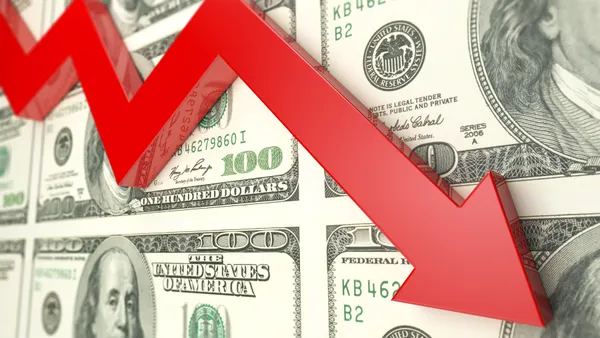Dive Brief:
- The 25% tariffs on Canada and Mexico and 10% tariffs on China announced this week by President Donald Trump would cost 344,000 jobs and reduce long-run economic output by 0.4%, according to Tax Foundation estimates that do not account for any retaliation by trade partners.
- At the same time, the import taxes — which Trump said could begin as early as Feb. 1 — would increase federal revenue by $1.2 trillion between this year and 2034, the Tax Foundation said in a report.
- “Historical evidence shows tariffs raise prices and reduce available quantities of goods and services for U.S. businesses and consumers, resulting in lower income, reduced employment and lower economic output,” the Tax Foundation said.
Dive Insight:
The Tax Foundation estimates roughly align with a forecast by the Committee for a Responsible Federal Budget, which Wednesday said the import taxes starting Feb. 1 would cut U.S. output by 0.3%, and raise $140 billion in revenue this year and $1.5 trillion in revenue through fiscal year 2035.
Still, “there is great uncertainty regarding the actual effects” of the import taxes, the CRFB said. Its calculations assume the tariffs apply to imports from the three countries that currently face minimal duties rather than all imports from the three.
While campaigning for president, Trump said blanket tariffs would create jobs, spur investment and help reduce the federal debt. He sought on Thursday to use the threat of tariffs to goad foreign businesses into investing in the U.S.
“My message to every business in the world is very simple, come make your product in America and we will give you among the lowest taxes of any nation on earth,” Trump said Thursday in a televised speech to the World Economic Forum in Davos, Switzerland.
“But if you don't make your product in America, which is your prerogative, then very simply you will have to pay a tariff, differing amounts, but a tariff which will direct hundreds of billions of dollars and even trillions of dollars into our Treasury to strengthen our economy and pay down debt,” he said.
Trump on Thursday appeared to soften the threat of trade war with China in an interview with Fox News.
“We have one very big power over China, and that's tariffs,” he said. “They don't want them and I'd rather not have to use it, but it's a tremendous power over China.”
Trump’s speech to the WEF gathering in Davos coincided with the release of a WEF report warning that the total costs from tariffs, export restrictions and other forms of global economic “fragmentation” could ultimately increase to roughly $5.7 trillion, or 5% of current global gross domestic product.
“A more fragmented global order will in most instances act as a cost driver,” the forum said. “In industries with higher exposure to geoeconomic fragmentation, firms have shifted from ‘just-in-time’ production models to costlier ‘just-in-case’ approaches that diversify portfolios and supply chains.
“Such measures can increase resilience but also increase costs,” the forum said. “Investment restrictions, export controls and tariffs can result in inefficient reorganizations of portfolios and supply chains, increasing global inflation.”















